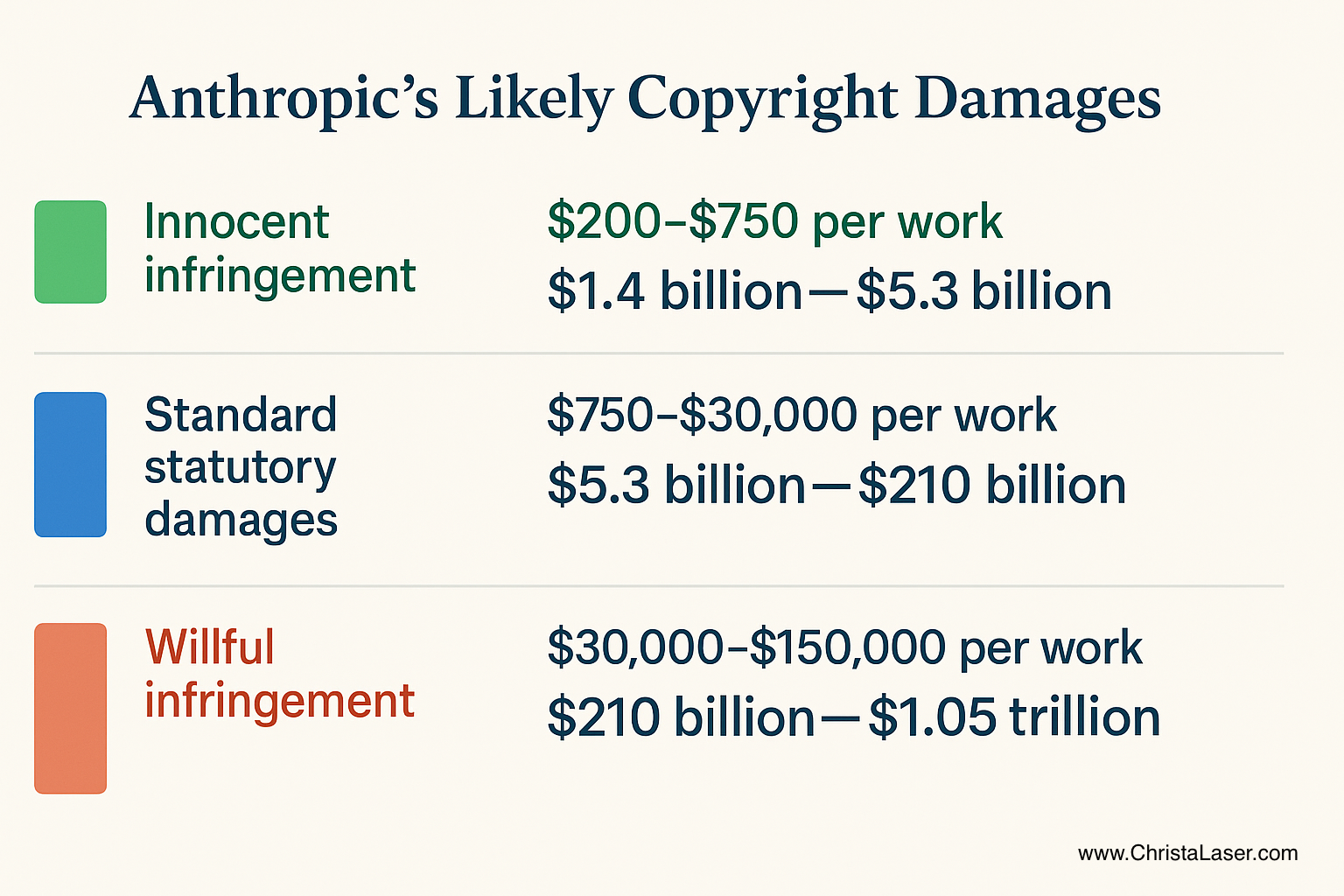Anthropic Faces Billions in Copyright Damages for 7 Million Pirated Works in Bartz v. Anthropic AI Training Decision

Update: Anthropic settled for $1.5 billion.
Original article: Following the Bartz v. Anthropic decision, Anthropic faces up to a trillion (and a minimum of $1.4 billion) in copyright statutory damages for downloading unlicensed copies of 7 million books for its library.
On June 23, 2025, Judge Alsup granted in part Anthropic's motion for summary judgment. The court ruled in favor of Anthropic that training an AI model was a "fair use" of copyrighted works and therefore, there is no copyright liability for the act of training and teaching an AI model, even on copyrighted works. Anthropic trained its model in part on lawfully purchased used books which it then digitized before destroying the physical copy. That act of changing the format of lawfully purchased items was also not an act of copyright infringement.
However, Judge Alsup found that the "fair use" of training an AI model on lawfully purchased works could not excuse widespread downloading and copying of unlawfully obtained works. Specifically, before embarking on the project to digitize used books, Anthropic downloaded about seven million copyrighted books without compensation from internet archives like LibGen. These archives contain pirated books. When Anthropic downloaded these pirated materials, it made a copy that constituted a separate act of copyright infringement. This act was not excused by the eventual use for AI training.
Now, the Bartz v. Anthropic case is moving forward to a trial on damages. How much liability could Anthropic face? Books are copyrighted works that are generally registered with the copyright office, entitling the copyright holders to high statutory damages, a required range of damages set forth by statute. Copyright statutory damages for works registered with the copyright office range from $200-$750 for innocent infringement (meaning the infringer did not know and would not reasonably believe that they are infringing a copyright), $750-$30,000 for standard statutory damages, and $30,000 to $150,000 for willful infringement (meaning the infringer knew or must have known that they were infringing a copyright). The highest award in history was an award against Cox for $1 billion for infringing 10,000 works (at a rate of $100k per work, which is within the range of willful infringement). A jury will decide where in this range Anthropic would fall.
If Anthropic is found to have infringed innocently, the damages could range from $1.4 billion (7 million works × $200) to $5.25 billion (7 million × $750). For standard statutory damages, the range would increase fall from $5.25 billion (7 million × $750) on the low end to $210 billion (7 million × $30,000) on the high end. And if a jury determines that Anthropic infringed willfully, the potential damages could range from $210 billion (7 million × $30,000) to a high of $1.05 trillion (7 million × $150,000). Anthropic currently asserts that it innocently infringed the works. Shortly after the decision, news emerged of Anthropic seeking to raise $3-5 billion in additional funds; it is possible that this fund raise is to cover the potential damages from copyright lawsuits while avoiding disruption to their operations.
Other AI training cases so far have not reached the damages stage or have ended before reaching that point. Kadrey v. Meta, for example, found that the "fair use" of copyrighted works for AI training excuses even egregious copyright infringement in creating training libraries (there, Meta used BitTorrent to pirate and potentially even contribute to the continued piracy of millions of works). These cases are likely to be appealed. However, the Bartz v. Anthropic decision strikes a balance between enabling AI training on lawfully obtained copyrighted works while punishing the downloading of pirated works without compensation to authors. Indeed, if any non-AI entity like a college kid working on an archive faces steep copyright liability for their downloading of copyrighted material without compensation, why shouldn't AI companies face the same liabilities for the same conduct? Awarding copyright statutory damages in court today can incentivize AI companies to enter into collaborative licensing arrangements or settlements with creators in the future.
I have a YouTube video discussing each case in depth: https://www.youtube.com/watch?v=wH1wX1V3Prw
